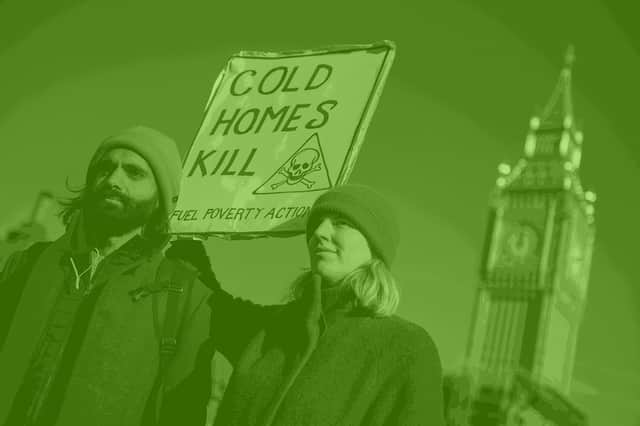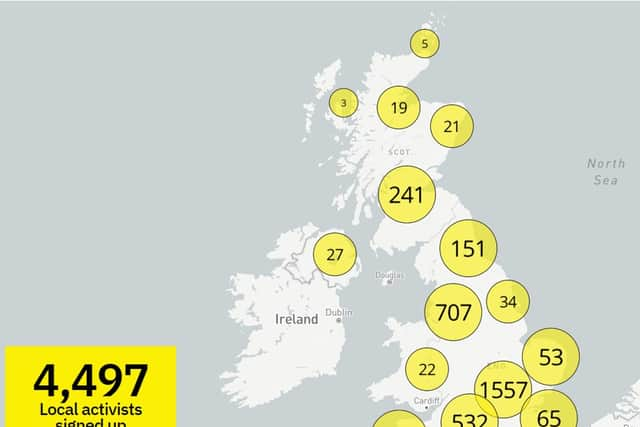Don’t Pay UK: what did Martin Lewis say on campaign to boycott energy bills - what happens if you don’t pay?


Campaigners are attempting to orchestrate what could be the largest consumer strike in UK history, if the hike in the energy tariff in October is not reversed.
Money saving expert Martin Lewis has warned that the Don’t Pay movement “is growing” and that it is “difficult to predict” what would happen if a significant number of people coordinated mass non-payment.
Advertisement
Hide AdAdvertisement
Hide AdA spokesperson at the Department for Business Energy and Industrial Strategy (BEIS) described the campaign as “highly irresponsible”.
What is the Don’t Pay energy bills campaign?
The campaign has been set up by members of the public frustrated by the rising cost of energy.
It is calling on people to pledge non-payment of their energy bills in October should the Government not intervene on the planned rise in the energy tariff.


The Don’t Pay campaign has signed up thousands of people across all parts of the UK to act as ‘organisers’, distributing leaflets and spreading the message to friends and acquaintances.
Advertisement
Hide AdAdvertisement
Hide AdAfter rising by around £800 earlier this year, the price cap on energy bills set by Ofgem - the government regulator of the energy market - is set to rise again by a similar amount in October.
Ofgem is expected to announce the level of the October price cap on 26 August, although analysts have forecast a significant rise.
The cap rose by 54% in April, leaving the average annual bill at £1,971, and it was announced today that it wil increase again by 80% in October.
This will mean the average household will be paying £3,549 from October, which is expected to rise again in December.
Advertisement
Hide AdAdvertisement
Hide AdThe Government maintains that nothing can be done to prevent energy prices rising for consumers, because wholesale gas prices have risen significantly globally, in part due to the war in Ukraine.
However, many have pointed to record profits posted by major fossil fuel companies such as Shell and BP, which ultimately supply main domestic energy firms, as proof that price-rises are at least in part being driven by excess profits.
The Don’t Pay campaign wants at least one million people to commit to not paying their energy bills, comparing their efforts to the widespread refusal to pay the poll tax introduced by Margaret Thatcher’s Conservative government, first in Scotland in 1989 and in England and Wales from 1990.
Millions of people refused to register and pay the new flat-rate tax, which was widely considered to be unfair towards those on lower incomes.
Advertisement
Hide AdAdvertisement
Hide AdFollowing a number of high profile protests and widespread opposition to the tax, including through non-payment campaigns, the poll tax was eventually scrapped by John Major’s Conservative government in 1992.
A BEIS spokesperson said: “This is highly irresponsible messaging, which ultimately will only push up prices for everyone else and affect personal credit ratings.
“We recognise that global inflationary pressures are squeezing household finances and people are struggling. That’s why the Government has introduced an extraordinary £37 billion to help households in these challenging times, including £1200 each for 8 million of the most vulnerable households.”
What is the Government doing about the rise in energy prices?
Back in May, Rishi Sunak announced that millions of households will receive a £400 discount off their energy bills, as part of a wider package to help ease the cost of living crisis.
Advertisement
Hide AdAdvertisement
Hide AdEight million low income households will benefit from the payment, which will be paid in two lump sums - one from July and the other from autumn.
Mr Sunak said it will give vulnerable people "certainty that we are standing by them at this challenging time", but added that the government would also provide “universal” support.
Appearing on ITVs Good Morning Britain, Martin Lewis warned that there are “dangers” involved for individuals participating in a consumer strike.juhhh
He said: “I think the Don’t Pay movement is growing. There are dangers to being in the Don’t Pay movement as an bn individual.
Advertisement
Hide AdAdvertisement
Hide Ad“All I can say is what would happen in a typical case scenario where an individual refused to pay – what is far more difficult to predict is if there is a massive movement not to pay.
“I think what is safest for me to say is while I think it should have come earlier, my hope is on September 5 there will be a new Prime Minister. We’ve heard from both the candidates, but they seem to indicate they understand the scale of the crisis – what we need to hear is concrete solutions.
“And let’s be absolutely plain: there are many methods that you can put in place to alleviate and mitigate some of the terrible damage that the rising energy prices are causing."
What happens if you don’t pay your energy bills?
The Government has warned that refusal to pay energy bills could put households into debt and affect personal credit ratings.
Advertisement
Hide AdAdvertisement
Hide AdThe Don’t Pay campaign has specified that those on pre-payment meters will not be able to participate in the consumer strike, as they will simply be cut off as soon as their balance reaches 0.
For those not on pre-payment meters, energy companies could cut off supply over non-payment, although this is rare and likely would not happen straight away if payment wasn’t made at the usual time.
The campaigners say they will not go ahead with the mass non-payment if not enough people sign up, as this would not have enough of an impact and would put people at risk of debt with little chance of affecting change.
In a statement on their website, Don’t Pay said that energy customers “are people, families and households whose energy bills are going up.”
Advertisement
Hide AdAdvertisement
Hide Ad“It’s not unrealistic to say we could reach 1 million people to start a non-payment strike. The potential leverage is huge.”
“With 1 million people, we can withhold £230 million for 28 days before energy companies can take any action. And then we can withhold another £230 million each month - possibly even more as the weather gets colder through winter and we use more energy. Possibly even more as more people start joining the strike.”
An Ofgem spokesperson said: “We know that this is an incredibly tough time for many people who are seeing their bills increase as a result of very high wholesale gas prices.
“We will continue to work with the government and the energy sector to try to mitigate the impact of these rises as much as we can, including through helping to deliver the Government’s Energy Bill Support Scheme.”
Comment Guidelines
National World encourages reader discussion on our stories. User feedback, insights and back-and-forth exchanges add a rich layer of context to reporting. Please review our Community Guidelines before commenting.
